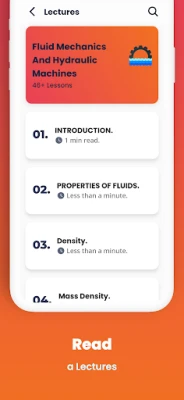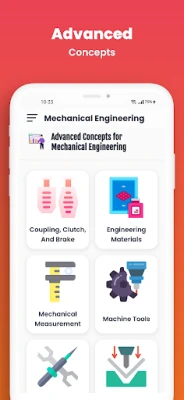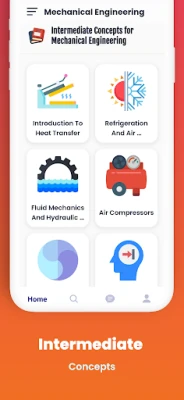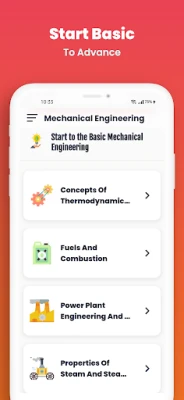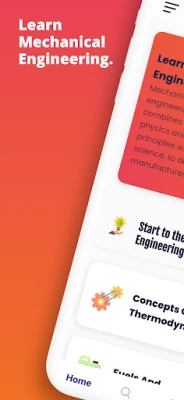
Latest Version
1.0.4
July 02, 2025
CODE WORLD
Education
Android
0
Free
com.codeworld.learnmechanicalengineering
Report a Problem
More About Learn Mechanical Engineering
Unlocking the World of Mechanical Engineering: A Comprehensive Guide
Mechanical engineering stands as a cornerstone of modern technology, encompassing the study, design, development, construction, and testing of mechanical and thermal devices. This field is pivotal in creating innovative solutions that enhance efficiency across various industries. In this article, we will explore the essential aspects of mechanical engineering, its significance, and the vast array of topics it covers.
Understanding Mechanical Engineering
Mechanical engineering is an interdisciplinary branch that merges principles of engineering physics, mathematics, and materials science. It focuses on the design, analysis, manufacturing, and maintenance of mechanical systems. As one of the oldest and most expansive engineering disciplines, it plays a crucial role in shaping the technological landscape.
Core Topics in Mechanical Engineering
To grasp the full scope of mechanical engineering, it is essential to delve into its core topics. Here are some key areas of study:
1. Thermodynamics
Thermodynamics is the study of energy, heat, and work. It is fundamental in understanding how energy is transferred and transformed in mechanical systems.
2. Engineering Materials
This area focuses on the properties and applications of various materials used in engineering, including metals, polymers, and composites.
3. Mechanical Measurement
Accurate measurement is vital in engineering. This topic covers the techniques and tools used to measure physical quantities in mechanical systems.
4. Machine Tools
Machine tools are essential for manufacturing processes. This section explores the various types of machine tools and their applications in production.
5. Casting and Welding
These processes are crucial for shaping materials. Understanding casting and welding techniques is essential for creating durable mechanical components.
6. Properties of Gases
This topic examines the behavior of gases under different conditions, which is vital for applications in thermodynamics and fluid mechanics.
7. Fuels and Combustion
Knowledge of fuels and combustion processes is essential for designing efficient engines and power systems.
8. Power Plant Engineering
This area focuses on the design and operation of power plants, including thermal, hydro, and renewable energy systems.
9. Internal Combustion Engines
Internal combustion engines are a key area of study, focusing on their design, operation, and efficiency improvements.
10. Steam Engines, Steam, and Gas Turbines
Understanding the principles behind steam engines and turbines is crucial for energy generation and mechanical design.
11. Properties of Steam
This topic covers the thermodynamic properties of steam, which are essential for various engineering applications.
12. Stress and Strain
Stress and strain analysis is fundamental in understanding material behavior under load, which is critical for structural integrity.
13. Lifting Machines
Lifting machines, such as cranes and hoists, are vital for material handling in construction and manufacturing.
14. Flywheel
Flywheels are used to store rotational energy. Understanding their design and application is essential in mechanical systems.
15. Heat Transfer
This area focuses on the mechanisms of heat transfer, including conduction, convection, and radiation, which are crucial in thermal management.
16. Air Conditioning
Air conditioning systems are essential for maintaining comfort in buildings. This topic covers the principles and design of HVAC systems.
17. Power Transmission
Power transmission involves the transfer of energy from one location to another, which is critical in mechanical systems.
18. Coupling, Clutch, and Brake
These components are essential for controlling motion in mechanical systems, and understanding their design is crucial for engineers.
19. Air Compressors
Air compressors are widely used in various applications. This section explores their design and operational principles.
20. Fluid Mechanics and Hydraulic Machines
Fluid mechanics is the study of fluids in motion and at rest, which is essential for designing hydraulic systems.
21. Mechanical Working of Metals & Metal Sheets
This topic covers the processes involved in shaping metals, including machining, forming, and joining techniques.
22. Manufacturing Systems
Understanding manufacturing systems is crucial for optimizing production processes and improving efficiency.
23. Unconventional Machining Processes
This area explores advanced machining techniques that go beyond traditional methods, offering innovative solutions for complex manufacturing challenges.
Why Pursue a Career in Mechanical Engineering?
Choosing to study mechanical engineering opens doors to a wealth of opportunities. Mechanical engineers are problem solvers who design and build solutions that enhance efficiency across various sectors. The demand for skilled mechanical engineers continues to grow, leading to promising job prospects and competitive salaries.
Moreover, the versatility of mechanical engineering allows professionals to work in diverse industries, from automotive and aerospace to energy and manufacturing. This variety ensures that no two days are the same, making it an exciting field for those who thrive on innovation and creativity.
Conclusion
Mechanical engineering is a dynamic and essential field that combines scientific principles with practical applications. By mastering the core topics and concepts, aspiring engineers can contribute to technological advancements and improve the quality of life across the globe. Whether you are just starting your journey or looking to deepen your knowledge, the world of mechanical engineering offers endless possibilities.
If you found this guide on mechanical engineering helpful, please leave a comment and rate us with 5 stars ★★★★★. Thank you for your interest!
Rate the App
User Reviews
Popular Apps










Editor's Choice











